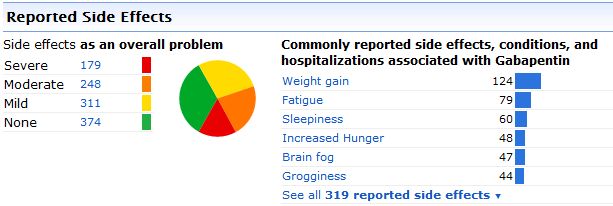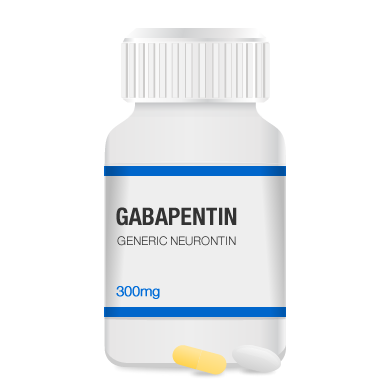What is gabapentin?
Gabapentin is an anti-epileptic drug, also called an anticonvulsant. It affects chemicals and nerves in the body that are involved in the cause of seizures and some types of pain.
Gabapentin is used together with other medicines to treat partial seizures in adults and children at least 3 years old.
Gabapentin is also used to treat neuropathic pain (nerve pain) caused by herpes virus or shingles (herpes zoster) in adults.
Use only the brand and form of gabapentin your doctor has prescribed. Check your medicine each time you get a refill to make sure you receive the correct form.
The Gralise brand of gabapentin is indicated for the management of neuropathic pain only. It is not used for epilepsy.
Horizant is used to treat nerve pain and restless legs syndrome (RLS).
The Neurontin brand is used to treat seizures in adults and children who are at least 3 years old, in addition to neuropathic pain.

What is Gabapentin side effects ?
Gabapentin may cause side effects. Tell your doctor if any of these symptoms are severe or do not go away:
- drowsiness
- tiredness or weakness
- dizziness
- headache
- uncontrollable shaking of a part of your body
- double or blurred vision
- unsteadiness
- anxiety
- memory problems
- strange or unusual thoughts
- unwanted eye movements
- nausea
- vomiting
- heartburn
- diarrhea
- dry mouth
- constipation
- increased appetite
- weight gain
- swelling of the hands, feet, ankles, or lower legs
- back or joint pain
- fever
- runny nose, sneezing, cough, sore throat, or flu-like symptoms
- ear pain
- red, itchy eyes (sometimes with swelling or discharge)
Some side effects may be serious. If you experience any of the following symptoms, call your doctor immediately:
- rash
- itching
- swelling of the face, throat, tongue, lips, or eyes
- hoarseness
- difficulty swallowing or breathing
- seizures
Gabapentin may cause other side effects. Call your doctor if you have any unusual problems while taking this medication.
Call your doctor at once if you have:
- increased seizures;
- fever, swollen glands, body aches, flu symptoms;
- skin rash, easy bruising or bleeding, severe tingling, numbness, pain, muscle weakness;
- upper stomach pain, loss of appetite, dark urine, jaundice (yellowing of the skin or eyes);
- chest pain, irregular heart rhythm, feeling short of breath;
- confusion, nausea and vomiting, swelling, rapid weight gain, urinating less than usual or not at all;
- new or worsening cough, fever, trouble breathing;
- rapid back and forth movement of your eyes; or
- severe skin reaction — fever, sore throat, swelling in your face or tongue, burning in your eyes, skin pain, followed by a red or purple skin rash that spreads (especially in the face or upper body) and causes blistering and peeling.
Some side effects are more likely in children taking gabapentin. Contact your doctor if the child taking this medication has any of the following side effects:
- changes in behavior;
- memory problems;
- trouble concentrating; or
- acting restless, hostile, or aggressive.
Common gabapentin side effects may include:
- dizziness, drowsiness;
- dry mouth, blurred vision;
- headache;
- diarrhea; or
- swelling in your hands or feet.
This is not a complete list of side effects and others may occur. Call your doctor for medical advice about side effects. You may report side effects to FDA at 1-800-FDA-1088.

Can You Overdose On Gabapentin?
Compared with some drugs, such as opioids, gabapentin appears to be relatively non-lethal in overdose situations, meaning the morbidity associated with a toxic dose is low. However, the primary danger of gabapentin overdose appears when individuals use gabapentin in conjunction with other drugs, such as alcohol or opioids.
Mixing substances with central nervous system depressant effects can easily result in an amplification of certain side effects and can lead to significant issues, including overdose. For instance, individuals using gabapentin in conjunction with alcohol are subject to intensified depressant side effects such as sedation and dizziness. Alcohol itself may also cause a more rapid release of the contents of certain extended-release tablet formulations of the drug, potentially putting the user at greater risk of gabapentin overdose.
Alcohol isn’t the only danger for those using gabapentin. Among those on a prescription opioid regimen, being concurrently prescribed gabapentin is associated with a substantially increased risk of opioid-related death.
an overdose of gabapentin may result in the following symptoms:
- Dizziness.
- Drowsiness.
- Double vision.
- Slurred speech
- Diarrhea.
- Nausea.
- Vomiting.
- Loss of control of bodily movements (ataxia).
- Low blood pressure.
- Rapid heart rate.
- Labored breathing.
- Coma (in patients with kidney failure).
Gabapentin overdoses are often medically managed without significant complications. Nonetheless, any type of drug overdose can be very serious, and some individuals may experience more severe reactions in the setting of a gabapentin overdose. For instance, children, elderly individuals, and those with impaired renal function may be at a much higher risk of complications from a toxic dose of gabapentin than healthy adults.
The concurrent ingestion of other substances may also result in a more dire medical situation and, as mentioned, could increase the likelihood of overdose death. Individuals who overdose on a combination of gabapentin and another drug with depressant effects (e.g., alcohol, benzodiazepines, opioids, etc.) are at serious risk of significant adverse effects, and these individuals may require immediate medical attention.
Gabapentin may cause respiratory depression when used alone or with other substances. Combining the drug with other respiratory depressing substances may be deadly.
Unfortunately, it is all too common for gabapentin to be prescribed to individuals who also use opioids, the combination of which can result in profound respiratory depression (especially when these drugs are misused in larger-than-recommended doses).
Because of the very real risk of dangerously slowed breathing and, ultimately, respiratory arrest, those who abuse gabapentin to intensify an opioid high may risk death with each use.
Depending on the severity of any resultant oxygen deprivation and the length of time that it persists, consequences may include:
- Seizures.
- Permanent brain damage.
- Coma.
- Death.
